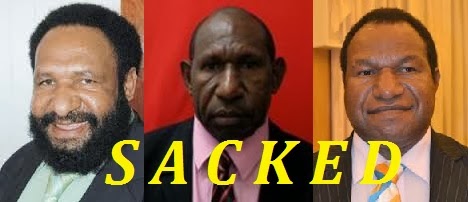The real reasons why Duma and Polye were sacked
NAMORONG REPORT
The sacking of William Duma was not related to the Oil Search shares deal. Despite the fact that Duma is Minister for Petroleum, his sacking may actually be related to dealings with the Solwara 1 experimental seabed mining project and the acquisition of the State’s interest. Duma would have most likely opposed the deal.
The state’s interest in the Solwara 1 project is held by Eda Kopa, a subsidiary of the state owned entity Petromin. The Minister for Petroleum is in charge of Petromin.
Duma was seen as an obstacle to the deal and so he had the rug pulled under his feet. The reason why Duma would have refused to agree is that the Solwara 1 deal is a bad deal in which the state is expected to make massive losses. Money that could be used to improve delivery of goods and services to Papua New Guineans will be sunk down the abyss in the Bismarck Sea.
Don Polye’s sacking on the other hand is linked to the Oil Search deal. As Minister for Treasury, Polye would have signed up to a large loan that was being made outside of the budget process and the accountability mechanisms associated with that. The Executive arm of government has committed the state to a A$1.239 billion loan without Parliament’s consent i.e. the consent of the people of Papua New Guinea through their elected representatives.
According to the cabinet’s decision made on the 6th of March, the loan facility being bankrolled by Swiss bank UBS will consist of A$ 335 million bridge loan and a A$ 904 million collar loan facility. The Kina today is worth around 40 Australian cents so the loan is worth around K3 billion.
To put this loan into context, government revenue for 2014 is expected to be K12.7 billion against a budget of K15 billion. The 2014 budget deficit was budgeted at K2.3 billion but as we’ve seen lately with Ok Tedi’s dismal performance and problems at Hidden Valley, there may be a deficit blowout.
Add the UBS loan to the budget deficit and one sees the level of government debt shooting through the roof. [Expect the government spin-doctors to tell you it doesn’t add to the budget deficit. What they won’t tell you is that this loan adds to overall national debt.]
Oh but in case you think it’s illegal, it isn’t. You see folks during the budget session last year, your horrible Members of Parliament amended the Fiscal Responsibility Act to raise the debt ceiling above 30 per cent of GDP. This basically allows the government to send national debt sky-rocketing. And that's exactly what they are doing with this UBS Loan.
Having sidelined Don Polye, Prime Minister Peter O’Neill as Treasury Minister can now clear the approvals for the UBS Loan. Polye’s elevation as IMF Chairman must have had some influence on him. Unlike the World Bank and the Asian Development Bank the IMF encourages nations to save mineral wealth and not to spend it all. By borrowing, the O’Neill government is essentially spending LNG Revenues before they start flowing.
The terms of the loan agreement are also not publicly available. There is a lack of transparency surrounding this deal as there is no Parliamentary scrutiny of this loan nor is there any public scrutiny. However, the sacking of Don Polye indicates that this loan is so bad for the country. No responsible Treasurer would have signed up to the UBS deal.
Details in the Cabinet decision indicate that the State’s 149 million shares in Oil Search shares will be held by Petromin. What is unclear though is who guarantees the loan – Petromin, National Petroleum Company of PNG (NPCP), or the State? However, this may be hinted to in a paragraph of the cabinet’s decision which notes the
“execution of a Payment Direction Deed as one of the Transaction Documents by National Petroleum Company of PNG (Kroton) Limited concerning payments from Papua New Guinea Liquefied Natural Gas Global Company LDC...”
The above paragraph may be interpreted to mean that perhaps the loan is being secured against NPCP’s dividend flow from the PNGLNG project. This sounds almost like it was taken out of the textbook of PNG’s Cayman Island’s deal in the 1990s where financial deals were being done using PNG’s mineral revenues.
The irony about this is that Oil Search shares were sold to the Arabs to ensure NPCP held the state’s shares in the PNGLNG project. Now the dividends flows to NPCP are being used to purchase Oil Search shares.
So what does this mean for the average Papua New Guinean working class person? If you take a look at the 2014 budget figures Personal Income Taxes are the number one (No.1) contributor to government revenues. Papua New Guinean workers will be forking out K2.8 billion in tax contributions to the 2014 budget. Company taxes lag behind second at K2.6 billion. PNG workers are the biggest losers who will be sweating their guts off to repay the O’Neill government’s debts.
The sacking of William Duma was not related to the Oil Search shares deal. Despite the fact that Duma is Minister for Petroleum, his sacking may actually be related to dealings with the Solwara 1 experimental seabed mining project and the acquisition of the State’s interest. Duma would have most likely opposed the deal.
The state’s interest in the Solwara 1 project is held by Eda Kopa, a subsidiary of the state owned entity Petromin. The Minister for Petroleum is in charge of Petromin.
Duma was seen as an obstacle to the deal and so he had the rug pulled under his feet. The reason why Duma would have refused to agree is that the Solwara 1 deal is a bad deal in which the state is expected to make massive losses. Money that could be used to improve delivery of goods and services to Papua New Guineans will be sunk down the abyss in the Bismarck Sea.
Don Polye’s sacking on the other hand is linked to the Oil Search deal. As Minister for Treasury, Polye would have signed up to a large loan that was being made outside of the budget process and the accountability mechanisms associated with that. The Executive arm of government has committed the state to a A$1.239 billion loan without Parliament’s consent i.e. the consent of the people of Papua New Guinea through their elected representatives.
According to the cabinet’s decision made on the 6th of March, the loan facility being bankrolled by Swiss bank UBS will consist of A$ 335 million bridge loan and a A$ 904 million collar loan facility. The Kina today is worth around 40 Australian cents so the loan is worth around K3 billion.
To put this loan into context, government revenue for 2014 is expected to be K12.7 billion against a budget of K15 billion. The 2014 budget deficit was budgeted at K2.3 billion but as we’ve seen lately with Ok Tedi’s dismal performance and problems at Hidden Valley, there may be a deficit blowout.
Add the UBS loan to the budget deficit and one sees the level of government debt shooting through the roof. [Expect the government spin-doctors to tell you it doesn’t add to the budget deficit. What they won’t tell you is that this loan adds to overall national debt.]
Oh but in case you think it’s illegal, it isn’t. You see folks during the budget session last year, your horrible Members of Parliament amended the Fiscal Responsibility Act to raise the debt ceiling above 30 per cent of GDP. This basically allows the government to send national debt sky-rocketing. And that's exactly what they are doing with this UBS Loan.
Having sidelined Don Polye, Prime Minister Peter O’Neill as Treasury Minister can now clear the approvals for the UBS Loan. Polye’s elevation as IMF Chairman must have had some influence on him. Unlike the World Bank and the Asian Development Bank the IMF encourages nations to save mineral wealth and not to spend it all. By borrowing, the O’Neill government is essentially spending LNG Revenues before they start flowing.
The terms of the loan agreement are also not publicly available. There is a lack of transparency surrounding this deal as there is no Parliamentary scrutiny of this loan nor is there any public scrutiny. However, the sacking of Don Polye indicates that this loan is so bad for the country. No responsible Treasurer would have signed up to the UBS deal.
Details in the Cabinet decision indicate that the State’s 149 million shares in Oil Search shares will be held by Petromin. What is unclear though is who guarantees the loan – Petromin, National Petroleum Company of PNG (NPCP), or the State? However, this may be hinted to in a paragraph of the cabinet’s decision which notes the
“execution of a Payment Direction Deed as one of the Transaction Documents by National Petroleum Company of PNG (Kroton) Limited concerning payments from Papua New Guinea Liquefied Natural Gas Global Company LDC...”
The above paragraph may be interpreted to mean that perhaps the loan is being secured against NPCP’s dividend flow from the PNGLNG project. This sounds almost like it was taken out of the textbook of PNG’s Cayman Island’s deal in the 1990s where financial deals were being done using PNG’s mineral revenues.
The irony about this is that Oil Search shares were sold to the Arabs to ensure NPCP held the state’s shares in the PNGLNG project. Now the dividends flows to NPCP are being used to purchase Oil Search shares.
So what does this mean for the average Papua New Guinean working class person? If you take a look at the 2014 budget figures Personal Income Taxes are the number one (No.1) contributor to government revenues. Papua New Guinean workers will be forking out K2.8 billion in tax contributions to the 2014 budget. Company taxes lag behind second at K2.6 billion. PNG workers are the biggest losers who will be sweating their guts off to repay the O’Neill government’s debts.







